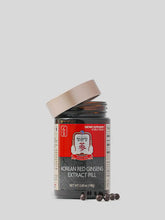Comparison of Ginseng vs. Ashwagandha
When comparing Ginseng and Ashwagandha, it’s essential to understand their origins, uses, and benefits. These two powerful herbs have been staples in traditional medicine for centuries, offering various health benefits. While they share some similarities, their differences are significant, making them suitable for different needs.
Understanding Ginseng: A Time-Tested Adaptogen
Ginseng, particularly Korean Red Ginseng, has been revered in Eastern medicine for thousands of years. Known for its adaptogenic properties, Ginseng helps the body resist stress and improve overall well-being. It primarily enhances energy levels, boosts immune function, and improves cognitive performance. Ginseng’s active compounds, known as ginsenosides, are responsible for these effects, making it a popular choice for those looking to increase stamina and endurance naturally.
Ginseng’s ability to balance the body’s systems is well-documented. It is often used to combat fatigue and promote mental clarity. The herb is also believed to support cardiovascular health by improving circulation and reducing oxidative stress. As a daily supplement, Ginseng can help maintain overall vitality, particularly in individuals dealing with chronic anxiety or those requiring a natural energy boost without the jitters associated with caffeine.
Ashwagandha: The Ayurvedic Wonder Herb
Ashwagandha, a staple of Ayurvedic medicine, is another adaptogen with a long history of use. This herb is primarily recognized for its calming properties. Unlike Ginseng, which energizes the body, Ashwagandha helps reduce stress and anxiety. It is also known to support thyroid function and improve sleep quality.
The active compounds in Ashwagandha, called withanolides, contribute to its stress-relieving effects. These compounds work by lowering cortisol levels, the hormone responsible for stress. By reducing cortisol, Ashwagandha helps the body manage stress more effectively, making it an ideal herb for those who experience anxiety or have trouble sleeping.
In addition to its stress-reducing benefits, Ashwagandha is also known for supporting muscle strength and recovery. It has been shown to enhance physical performance, making it a popular choice among athletes and those engaged in regular physical activity.
Comparing The Health Benefits Of Ginseng And Ashwagandha
Ginseng and Ashwagandha are highly regarded for their health benefits, but their effects on the body are distinct. Ginseng is more energizing and often enhances physical and mental performance. It is particularly beneficial for individuals who need an extra boost in energy, focus, and stamina.
On the other hand, Ashwagandha is more calming, promotes relaxation, and reduces stress. It is ideal for those dealing with anxiety, insomnia, or high levels of stress. While Ginseng can help you power through a busy day, Ashwagandha is more suited for winding down and promoting restful sleep.
Ginseng: More Than Just An Energy Booster
Beyond its role in increasing energy and stamina, Ginseng offers a range of additional health benefits that make it a versatile supplement. Studies suggest that Ginseng may help improve cognitive function, particularly in memory and mental clarity, making it valuable for those facing demanding mental tasks. It’s also known to support immune health by boosting the body’s natural defenses, potentially reducing the risk of infections.
Furthermore, Ginseng's anti-inflammatory properties may help reduce chronic inflammation, which is linked to numerous health conditions. For individuals with high levels of oxidative stress, Ginseng’s antioxidants help neutralize free radicals, promoting better overall health and longevity. With its wide range of benefits, Ginseng is a powerful ally for both physical and mental well-being.
When To Use Ginseng Vs. Ashwagandha
Deciding between Ginseng and Ashwagandha depends mainly on your specific needs. Ginseng is likely the better choice if you’re looking for a natural way to boost your energy and focus. It’s beneficial during times of increased physical or mental demand. Whether you’re preparing for a big project, recovering from illness, or simply need to stay alert and productive, Ginseng can provide the support you need.
Conversely, Ashwagandha may be more beneficial if stress and anxiety are your primary concerns. This herb is excellent for helping the body relax and recover from the effects of chronic stress. It can be beneficial in the evening when you need to unwind after a long day or if you’re struggling with sleep issues.
Combining Ginseng And Ashwagandha: Is It Possible?
Some individuals wonder if it’s possible to take Ginseng and Ashwagandha together. While these two herbs have different effects, they can be combined under certain circumstances. For instance, taking Ginseng in the morning and Ashwagandha in the evening could provide a balanced approach to managing energy levels and stress throughout the day. However, monitoring your body’s response and consulting with a healthcare provider is crucial to ensure this combination is appropriate.
Choosing The Right Supplement: What To Look For
Quality is critical when selecting a Ginseng or Ashwagandha supplement. Look for products from reputable companies that use high-quality, pure ingredients. For Ginseng, ensure that the supplement contains a standardized amount of ginsenosides, as these are the active compounds responsible for its benefits. For Ashwagandha, the concentration of withanolides is an essential indicator of potency.
Additionally, consider whether the supplement is free from additives, fillers, or artificial ingredients. Organic or wild-crafted options may offer a purer form of the herb, reducing the risk of pesticide exposure or other harmful chemicals.
Frequently Asked Questions (FAQs) About Ginseng Vs. Ashwagandha
1. Can I take Ginseng and Ashwagandha together?
Yes, Ginseng and Ashwagandha can be taken together, but it’s essential to understand how each herb affects your body. Ginseng is energizing, while Ashwagandha is calming. Combining them can provide a balanced approach to managing energy and stress, but it’s advisable to consult with a healthcare provider to ensure it’s appropriate for your specific needs.
2. Which is better for anxiety, Ginseng or Ashwagandha?
Ashwagandha is generally considered better for managing anxiety due to its calming properties. It helps lower cortisol levels, which are often elevated in people with anxiety. Conversely, Ginseng is more stimulating and may be less effective in reducing stress.
3. How long does it take to see results from Ginseng or Ashwagandha?
The time it takes to see results can vary depending on the individual and the condition being treated. For Ginseng, some people may notice an increase in energy and focus within a few days, while others may take a few weeks. Ashwagandha may take several weeks to show significant effects, particularly in reducing stress and improving sleep.
4. Are there any side effects of taking Ginseng or Ashwagandha?
Ginseng and Ashwagandha are generally safe when taken as directed, but they can cause side effects in some individuals. Ginseng may cause insomnia, nervousness, or headaches, especially in large doses. Ashwagandha may cause drowsiness or gastrointestinal issues, particularly in higher doses. It’s essential to start with a low dose and monitor how your body reacts.
5. Can Ginseng or Ashwagandha interact with medications?
Yes, both Ginseng and Ashwagandha can interact with certain medications. Ginseng may interact with blood thinners, diabetes medications, and certain antidepressants. Ashwagandha may interact with thyroid medications, sedatives, and immunosuppressants. Always consult with your healthcare provider before adding these supplements to your routine, especially if you are on prescription medications.
6. Which is better for improving sleep, Ginseng or Ashwagandha?
Ashwagandha is typically the better choice for improving sleep due to its calming effects. It helps reduce cortisol levels, promoting relaxation and making it easier to fall asleep. Ginseng, being more stimulating, is not recommended for those looking to improve sleep.
7. Is Ginseng or Ashwagandha better for boosting the immune system?
Ginseng and Ashwagandha have immune-boosting properties, but they work in different ways. Ginseng enhances the immune system by increasing the production of white blood cells, which help fight infections. While ashwagandha also supports immune health, it focuses more on reducing stress-related immune suppression. Your choice may depend on whether you need an immune boost or stress management.
8. Can pregnant women take Ginseng or Ashwagandha?
Pregnant women should avoid Ginseng and Ashwagandha unless advised by a healthcare provider. Both herbs can substantially affect the body, and their safety during pregnancy has not been fully established. It’s always best to consult with a healthcare professional before using herbal supplements during these periods.
9. Which herb is better for physical performance, Ginseng or Ashwagandha?
Ginseng and Ashwagandha can enhance physical performance, but they do so differently. Ginseng is known for increasing stamina and endurance, making it ideal for those looking to boost energy during physical activities. On the other hand, Ashwagandha supports muscle recovery and strength, which can benefit athletes looking to enhance overall performance and recovery time.
10. How should I choose between Ginseng and Ashwagandha?
The choice between Ginseng and Ashwagandha depends on your specific health goals. Ginseng may be better if you need more energy, focus, and physical stamina. If you’re dealing with stress, anxiety, or sleep issues, Ashwagandha is likely the most suitable choice. Consider your needs and consult a healthcare provider to determine which herb is best for you.
Choosing The Best Herb For Your Needs
Understanding your health goals is crucial when choosing between Ginseng and Ashwagandha. Ginseng offers an energizing boost, making it ideal for those who need increased stamina and focus. Ashwagandha provides calming benefits, making it perfect for stress relief and relaxation. To explore high-quality Ginseng supplements, visit Korea Ginseng Corp and discover the best options for your health and wellness journey.
Read More
- Ginseng for Vitality and Longevity: How This Herbal Wonder Supports Healthy Aging
- Unlocking the Secrets of Ginseng: Ancient Uses and Modern Applications
- From Stress Relief to Immune Support: How Ginseng Enhances Overall Wellbeing







 Stamina
Stamina Energy
Energy Immunity
Immunity Antioxidant
Antioxidant Beauty
Beauty Fitness
Fitness Blood Circulation
Blood Circulation Liver & Heart
Liver & Heart Bones & Joints
Bones & Joints Eye & Brain
Eye & Brain Digestion
Digestion Relax & Sleep
Relax & Sleep For All
For All Men's Health
Men's Health Woman's Health
Woman's Health Kid's Health
Kid's Health Jar
Jar Stick
Stick Pouch
Pouch Root & Slices
Root & Slices Shot
Shot Pill
Pill Tea & Powder
Tea & Powder Candy
Candy





